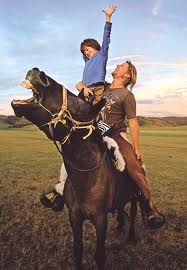*Resource adapted from Parelli.com Natural Horsemanship
Before you label your horse/addict as lazy, try thinking about things from his point of view. When you ask him to do something, have you ever stopped to think about what’s in it for him – how it looks from his side of things? Horse/Alcoholic Whispering is a form of training that asks you to think about things from your horse’s point of view, and you will find that this approach is more helpful than anything for dealing with “lazy” horses.
 You might be all excited about going for a ride, but how does your horse feel? Maybe for him, hanging out with his pasture mates and grazing on grass is more attractive, much less stressful and a whole lot more fun than dealing with the spurs, whips, heavy saddles and the stress of taking you for a ride on his back. Animals with this attitude are often labeled as lazy horses or stubborn horses, but usually they’re just unmotivated because what you’re asking them to do isn’t much fun for them.
You might be all excited about going for a ride, but how does your horse feel? Maybe for him, hanging out with his pasture mates and grazing on grass is more attractive, much less stressful and a whole lot more fun than dealing with the spurs, whips, heavy saddles and the stress of taking you for a ride on his back. Animals with this attitude are often labeled as lazy horses or stubborn horses, but usually they’re just unmotivated because what you’re asking them to do isn’t much fun for them.
Determining Cause
Whispering begins the process of solving any horse behavior problem with the question: Why is the horse/addict acting this way? Sometimes lazy horses are actually nervous horses or frightened horses. Sometimes the horse just has a laid back horse personality. Understanding your horse and what’s actually going on with him is the basis of Whispering. Once you have determined that your horse is neither scared nor sick and is simply unmotivated, we suggest you learn what excites and motivates your horse.
So, have you got a lazy horse and you don’t know what to do about it?

Think about when you feel lazy. Have you ever noticed how your laziness disappears in the face of something that interests you? Like humans, horses become lazy when they are bored, disinterested and/ or unmotivated. Barring illness, lazy horses are just unmotivated horses.
When faced with a lazy horse, the whispering approach determines why the horse is unmotivated when he is with you and figures out what interests the horse. If you can do that, you’ll be amazed at how motivated and un-lazy your horse suddenly becomes!
Personality and Horse Laziness
“Horsenality” is the method of figuring out your horse’s basic personality type and learning to understand his psychology and behavior from that matrix. One of the 4 personality types thinks humans are downright boring. But once you know what makes this horse tick and learn to engage him in the ways that motivate him, you will end up with a great horse. (See webpage: “Understanding Each Other, Why Bother” for more info and a short, fun personality test.)
Should you really have to make this much effort to “figure out” your horse/addict? Well, yes. The Whispering approach is based on developing a positive relationship with your horse, and the basis of all healthy relationships is understanding your partner, NOT forcing behavior change.
The Key To Success With A Lazy Horse
Unlike traditional horse training, which usually involves using more physical pressure (kicking, spurs, whips), the whispering approach is to understand that the key to a successful partnership with this horse/addict is mental, not physical. Forcing a horse to change will only result in more resentment and defiance. To become your horse’s trusted partner, you need to apply psychology not force to shift the horse’s behavior pattern. For a lazy horse, positivity is the key to success. This horse wants to know what’s in it for him!

Whispering is flexible. Rather than rigid rules, we seek to understand each individual horse and what works for him or her. Flexibility and positivity – horse/addict whispering at its best.
Although Betty is retired, you may contact her at b.pennington@yahoo.com if you would like to visit (no charge) or click on the link to the free eBooklet for additional info:
Free eBooklet: Alcoholic Whispering 101 – Bronco Taming Skills for Families
* The Fine Print: Cut-to-the-Chase Coaching’s mission is to inspire, empower and educate families of addicts. It is not affiliated with any natural horsemanship program or treatment facility and is not to be considered counseling or therapy. Working with alcoholic/addicts is potentially dangerous. Always use your own judgment and/or get the advice of professionals to find the right strategies for your life.
